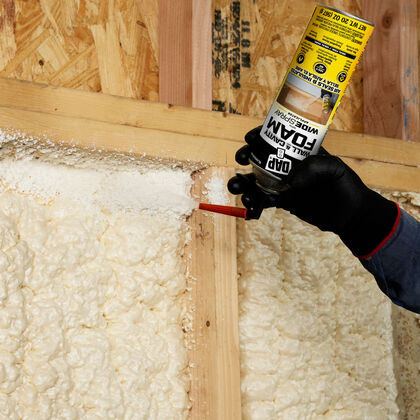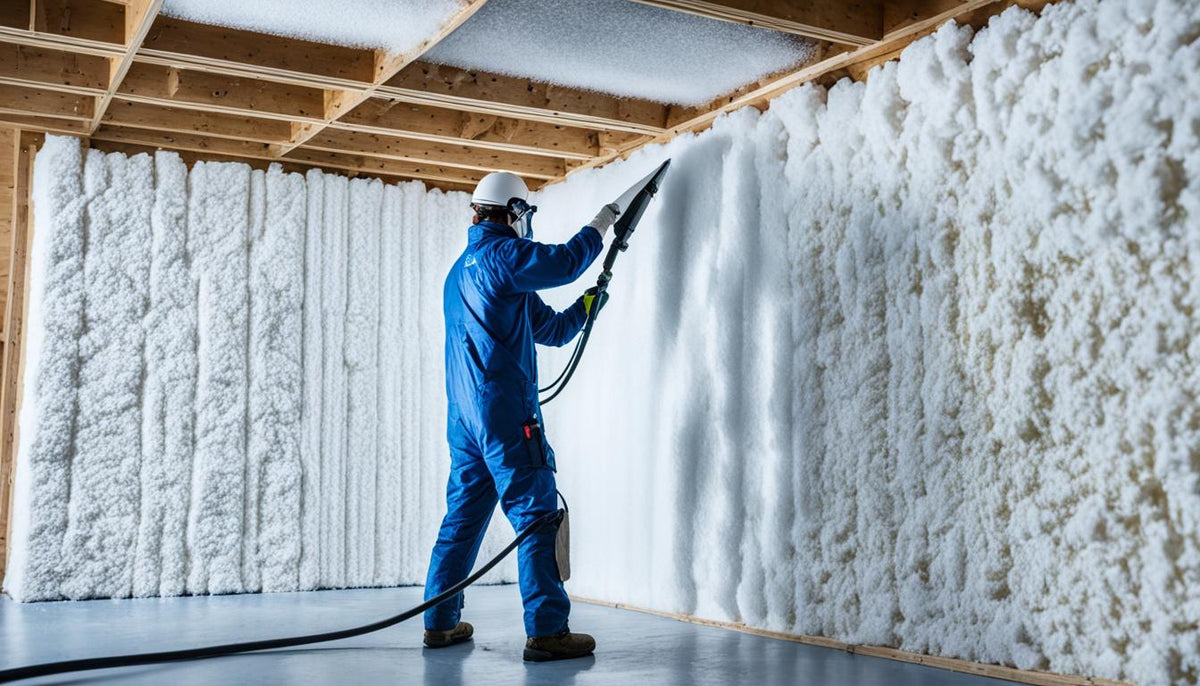Understanding the Benefits of Using Spray Foam for Insulation Projects
Understanding the Benefits of Using Spray Foam for Insulation Projects
Blog Article
Spray Foam: The Ultimate Solution for Air Sealing and Insulation
Spray foam insulation has become a leading remedy for effective air securing and thermal insulation, providing an one-of-a-kind combination of buildings that establish it in addition to traditional methods. Its ability to broaden and fill voids makes it particularly effective in stopping air leak, which can substantially affect energy performance. Nevertheless, understanding the full range of its advantages, installation procedures, and contrasts with various other insulation kinds is vital for making notified choices. As we discover these aspects, the effects for both brand-new buildings and retrofits become significantly considerable. What aspects should affect your option?
What Is Spray Foam?
Spray foam is a versatile insulation material that combines the concepts of air sealing and thermal resistance to improve power performance in structures. Composed mainly of polyurethane or various other similar compounds, spray foam is used as a fluid that broadens upon call with surfaces, creating a solid, continuous layer of insulation. This one-of-a-kind property permits it to load gaps, splits, and spaces that traditional insulation products might forget, supplying a premium air seal.
There are 2 major kinds of spray foam: open-cell and closed-cell. Open-cell spray foam is lighter and more adaptable, providing outstanding audio absorption and a lower R-value per inch - Spray Foam. On the other hand, closed-cell spray foam is denser, providing a higher R-value, dampness resistance, and added architectural integrity to constructing components
The application process normally includes specialized tools, making sure a smooth application that abides by various substrates, consisting of timber, metal, and concrete. This flexibility makes spray foam suitable for both brand-new constructions and retrofitting existing frameworks. Its capacity to create an impermeable obstacle considerably adds to reducing power intake and enhancing interior air quality, thus making it a preferred selection amongst house owners and home builders alike.
Advantages of Spray Foam Insulation
Among one of the most significant benefits of spray foam insulation is its extraordinary ability to produce a constant air barrier, which efficiently reduces energy loss. Unlike standard insulation materials, spray foam increases to fill up splits and gaps, making certain that air leak is significantly minimized. This particular not only enhances energy efficiency however additionally causes lower utility bills gradually.
Furthermore, spray foam insulation offers superior thermal resistance, adding to an extra secure interior setting. Its high R-value per inch permits for efficient insulation in confined areas, making it suitable for attics, walls, and crawl rooms. In addition, the moisture-resistant residential properties of spray foam help avoid mold and mold growth, promoting healthier living problems.
One more critical benefit of spray foam insulation is its sound-dampening top qualities (Spray Foam). It properly decreases noise transmission in between areas, producing a quieter and extra comfy home setting. The durability of spray foam likewise stands apart, as it does not droop or clear up over time, keeping its performance throughout its lifespan
Just How Spray Foam Works
Understanding how spray foam insulation works is necessary for valuing its efficiency in air sealing and thermal resistance. Spray foam insulation includes two key parts: isocyanate and polyol resin. When these elements are blended, they undergo a chain reaction that causes the material to broaden swiftly, creating a dense foam that fills up splits, tooth cavities, and voids.
As the foam broadens, it sticks to surface areas, developing an impermeable seal that considerably lowers air seepage. This particular makes spray foam insulation very efficient at preventing drafts and moisture infiltration, which can cause energy loss and damages gradually. In addition, the closed-cell variant of spray foam supplies superior thermal resistance due to its stiff structure, efficiently minimizing warm transfer.
The unique residential properties of spray foam permit it to satisfy irregular surfaces, guaranteeing extensive protection and a smooth obstacle. As a result, spray foam insulation not only boosts energy efficiency but additionally contributes to enhanced interior air quality by reducing the accumulation of toxins and irritants. Inevitably, recognizing the technicians behind spray foam highlights its function as a premium choice for insulation and air securing in both business and household applications.
Installment Process Overview

Before installment, the room has to Full Report be properly cleansed and prepped, making sure that surface areas are without moisture, debris, and dust. This step is essential due to the fact that impurities can endanger adhesion and overall performance. As soon as the location is prepared, the application entails blending the 2 components of the spray foam, which increases upon get in touch with and loads gaps successfully.
Trained experts must conduct the installation, making use of specialized devices to ensure uniform protection and optimum thickness. Security preventative measures, including using protective equipment and guaranteeing appropriate air flow, are vital during this process. After application, the foam commonly remedies rapidly, developing a strong barrier that boosts power efficiency.
Comparing Spray Foam to Traditional Insulation
When reviewing insulation options, spray foam insulation sticks out in contrast to typical materials such as fiberglass and cellulose. One of the key advantages of spray foam is its exceptional air sealing abilities. Unlike fiberglass and cellulose, which can permit air seepage, spray foam expands upon application, filling gaps and spaces to create an airtight seal. This results in enhanced energy performance, as much less warmed or cooled air leaves the home, bring about reduced energy expenses.
Additionally, spray foam gives a greater R-value per inch than conventional insulation types, using more efficient thermal resistance in a thinner profile. This particular is specifically beneficial in rooms with minimal tooth cavity deepness. Spray foam is resistant to wetness and mold growth, which can be a significant concern with cellulose and fiberglass, particularly in humid settings.
However, spray foam insulation generally lugs a greater upfront price than its standard equivalents. Property owners should evaluate this preliminary investment versus lasting energy financial savings and performance advantages. Eventually, while both insulation types offer their purpose, spray foam arises as an advanced remedy for modern insulation needs, especially in regards to air securing and thermal efficiency.

Verdict
In recap, spray foam insulation stands for a very reliable remedy for accomplishing optimum air securing and thermal resistance. Its unique residential properties, including moisture resistance and audio dampening, make it suitable for different review applications in both brand-new constructions and retrofitting tasks (Spray Foam). The preliminary prices might be higher compared to traditional insulation products, the lasting advantages, such as considerable power financial savings and improved interior air high quality, validate the financial investment and underscore its worth in modern-day building techniques.
Spray foam insulation has you can look here emerged as a leading solution for reliable air securing and thermal insulation, providing an unique mix of properties that set it apart from typical methods.Spray foam is a flexible insulation product that incorporates the principles of air securing and thermal resistance to enhance power efficiency in structures.When evaluating insulation alternatives, spray foam insulation stands out in comparison to typical materials such as fiberglass and cellulose. Inevitably, while both insulation kinds offer their function, spray foam arises as a much more innovative solution for contemporary insulation demands, especially in terms of air securing and thermal efficiency.
In recap, spray foam insulation stands for a highly effective service for accomplishing optimum air securing and thermal resistance.
Report this page